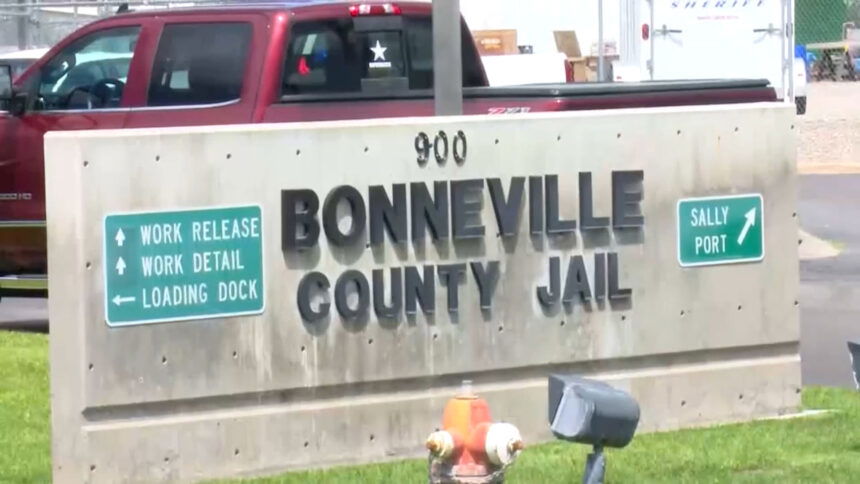Criminal offenders are still held accountable during the pandemic


IDAHO FALLS, Idaho (KIFI/KIDK) - Some people may have an inaccurate perception of how COVID-19 is impacting our public safety in regard to holding capacities in our jail facilities during the age of social distancing.
The pandemic has impacted our daily lives in many big ways but also in little ways, in little areas. Law enforcement tells us those little bits add up. The ebb and flow of the jail has changed quite a bit because of the pandemic, though crime itself has not slowed down.
Deputies and officers are still booking offenders into jail when it is appropriate but they have taken a cite and release approach to keep Bonneville County Jail virus-free.
“We are still operational, we are still taking people into jail everyday,” Bonneville County Sheriff’s Office Captain Sam Hulse said. “We are taking calls, we are arresting people appropriately and processing them through the system. The courts are operational and handling and adjudicating cases.”
A shallow once-over may lend to the perception that parolees and supervised individuals on probation are operating with impunity and not receiving sanctions.
“The virus has obviously put a lot of pressure on the system, but the system is still holding people accountable to these processes,” Captain Hulse said.
Captain Hulse says the coronavirus has impacted the processing of people coming into the jail in that offenders are being processed through the court system rather than being placed in custody whenever possible.
“Certain types of misdemeanor crimes where you may have been incarcerated, a lot of times we’re diverting that incarceration,” Captain Hulse said. “They still have their accountability to a pretrial release system and all of that is controlled by the courts, so the courts would ultimately see that person and decide that.”
Criminal offenders must still go through the court process and answer for wrong-doings before a judge. That judge may still sentence the individual to serve jail time. Currently, the court systems are backed up and slowed down, which has caused the flow of inmates into the jail to slow as well.
Before the pandemic, someone who broke the law might be booked into jail before going to court and the sentencing would reflect time served. Because those inmates are not serving the initial jail time before answering to the judge, they are losing credit for time served.
Some misdemeanor crimes and probation violation sanctions may now take on the form of ankle monitoring in lieu of in-custody incarceration. Decisions to divert incarceration are handled on a case-by-case basis.
Capital Hulse says history is always a factor in making that decision. Repeated misdemeanor-level offenses, especially in a short period of time, failure to appear for past charges, and active warrants for arrest are all factors that are taken into consideration.
“If it’s a first-time offense and there’s a way to divert them away from the jail, we will do that if we’re able to,” Captain Hulse said.
First-time felony offenses with limited risk to the public may not result in jail time but will go through a pretrial release process that may include book and release that could also include ankle monitoring. Pretrial services monitor how the person is doing in the community. How these cases are handled depends on the capacity within the pretrial system.
Documentation is still passed along to the courts and that individual could later be sentenced to incarceration by the judge.
“We’ve tried to reduce that pressure on the overall jail operation for the purposes of limiting the possibilities of COVID exposure in our jail facility. We are still taking the people that are sentenced by the court and/or arrested by patrol...we’re processing those individuals into the facility appropriately based on charging...Depending on the type of crime or the severity, they will still go to jail,” Captain Hulse said. “We look at the seriousness of the crime and the risk to public safety, all of that’s taken into consideration as to whether or not that person would be diverted from jail.”
There is also a decrease in the number of inmates being transported to Idaho prisons. Jail staff are limiting regular operations of work release to limit the exposure of inmates to COVID-19 in the community to prevent bringing it back into the correctional facility. Work detail is operating differently in the age of COVID as well to limit outside infections making their way back into the jail population.
Previously, inmates had to undergo 14 days of isolation in the booking area of the jail to prevent a spread within the facility. Standard isolation procedures created decreased capacity and increased pressure in the booking facility areas within Bonneville County Jail. General population ran under max capacity and saw very little or no strain from isolation.
Now, COVID-19 testing is part of the booking process. Results can take anywhere between 24 hours and several days. Individuals are isolated while awaiting test results. Negative results allow the inmate to move into the general population whereas positive tests result in a 10 day quarantine.
Bonneville County Jail typically holds 300-325 inmates on any given day. Today, that number sits at 260. The maximum holding capacity of the jail is roughly 530 inmates.
“If there are individuals out there feeling like they can get away with something, you’re not going to. We’re going to hold you accountable to the laws that are in place,” Captain Hulse said.
Captain Hulse says law enforcement is recognizing the increased level of substance use within our community. He says many people are falling out of recovery during the pandemic and this is a very serious side-effect of the pandemic that no one could have anticipated. He says individuals who are actively using need to look into community resources such as the Center for Hope and the Behavioral Health Crisis Center.
“I would encourage people that if you’re in a dark place or if you’re failing in your recovery, there are still places that you can reach out to,” Captain Hulse said. “It’s easy to feel hopeless and disconnected. You are able to reach out, there are services in the community that can help you. We want people to be engaged with and encourage them in their recovery from substance use and/or mental illness.”
